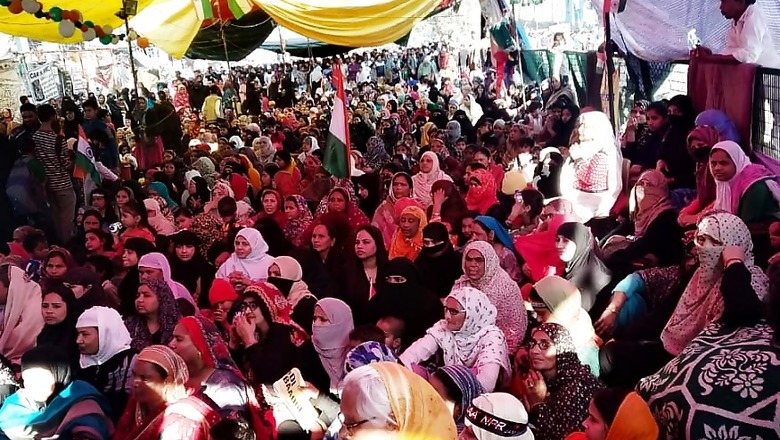
views
New Delhi: After weeks of staying put on the road in Delhi’s Shaheen Bagh, the women protesting against the Citizenship Amendment Act (CAA)marched towards Home Minister Amit Shah’s residence with scores of other protesters on Sunday but had to return after being denied permission.
Later, the organisers of the protest said they will march to Shah's home for a dialogue after getting due permission from authorities. The protesters have applied to the Deputy Commissioner of Police for permission to march from Shaheen Bagh to Krishna Menon Marg, where the minister stays.
A large posse of security personnel was deployed at Shaheen Bagh in south-east Delhi and barricades placed at the site. As the march on Sunday afternoon began, an eight-member delegation of elderly women, popular now as ‘Shaheen Bagh dadis’, walked up to the police who had set up barricades and asked for an update on their request for permission to meet Shah. They were stopped after a little distance.
“The administration is keen on this. Their request will be forwarded and when they get permission, we will let them proceed,” a police official told News18.
The protesters then returned to the tent erected on the road in Shaheen Bagh, which has become synonymous with the resistance against the CAA. They said they would wait for permission or else “the government should come and meet us”.
"Police said they have forwarded our request to meet the home minister and have sought some time to arrange it," said Javed Khan, one of the protesters.
Police officials, including DCP (Southeast) RP Meena, Additional DCP (Southeast) Kumar Gyanesh and the Shaheen Bagh Station House Officer (SHO) held talks with a group of protesters, assuring them that their application has been forwarded to the authorities concerned for further action.
"The protesters wanted to know about the status of their application. This was regarding permission for marching from Shaheen Bagh to the residence of the Home Minister, which they had given to us," said Meena. "We told them the application was given to DCP New Delhi and it will be further submitted to the police headquarters, which will take a final call on it."
The protesters, mainly women, have been staging a sit-in demonstration for the past two months against the CAA, National Register of Citizens (NRC), and National Population Register (NPR).
While the police said they had asked the protesters to form a delegation on Saturday, the women said the protest was "leaderless" and it was up to Shah to decide who all he wanted to call for discussions.
An announcement in this regard was also made by a speaker from the dais at the protest venue on Saturday. "We are ready to meet the Home Minister. But he should make it clear how many people he wants to meet," Syed Ahmed Taseer, one of the organisers, had said.
In an interaction with a news channel earlier this week, Shah said anyone who wants to discuss issues related to the CAA with him can seek time from his office. "(We) will give time within three days," he had said.
Protests had unfolded in Shaheen Bagh, Zakir Nagar, Jamia Nagar, Khureji Khas and other places in the national capital and elsewhere across the country in December to oppose the CAA and the NRC.
According to the CAA, members of Hindu, Sikh, Buddhist, Jain, Parsi and Christian communities who have come from Pakistan, Bangladesh and Afghanistan till December 31, 2014 and facing religious persecution there will not be treated as illegal immigrants but will be given Indian citizenship. The law excludes Muslims.
Those opposing the law contend that it discriminates on the basis of religion and violates the Constitution. They also allege that the CAA along with the NRC is intended to target the Muslim community in India. However, the central government has said that the law is intended to give citizenship to persecuted people from the three neighbouring countries and not to take away citizenship from anyone.
(With PTI inputs)

















Comments
0 comment